Giving Beekeeping Guidance by cOmputatiOnal-assisted Decision making
#BeekeeperStories
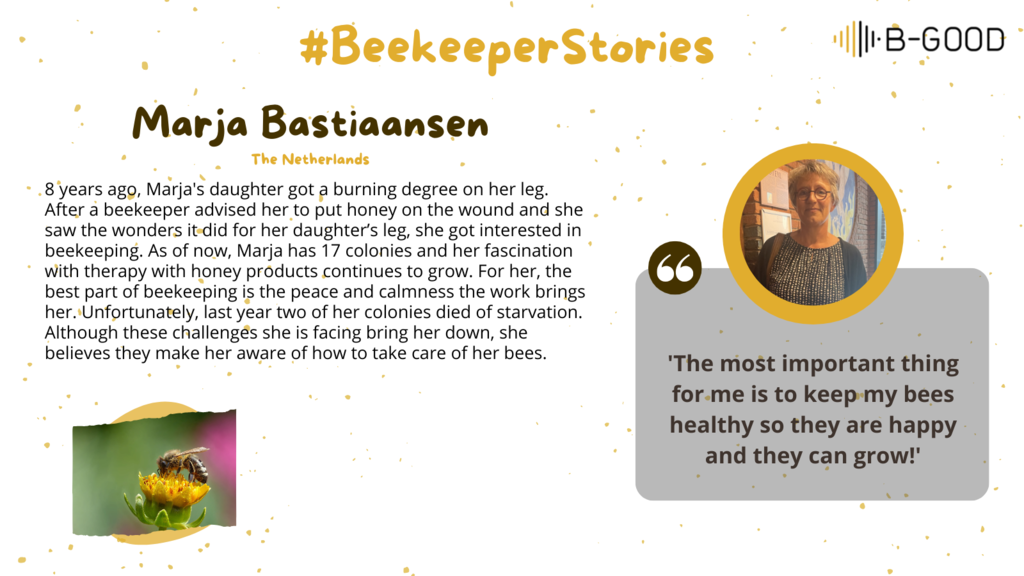
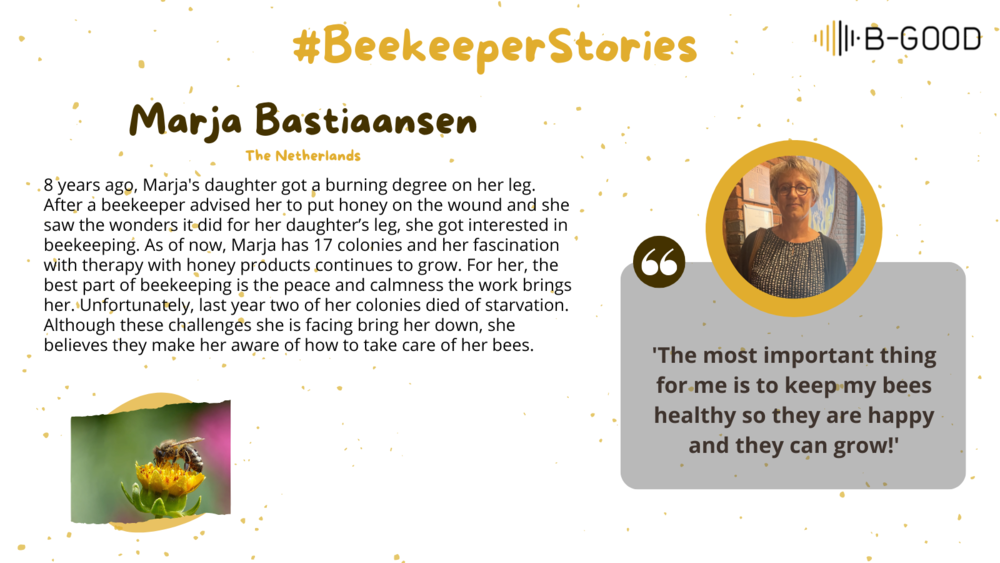
The first post of the new B-GOOD series features Marja Bastiaansen. She is a beekeeper from the Netherlands and told us the story of her beekeeping journey and long-term goals.
Eight years ago, Marja’s daughter got a serious burning degree on her leg. After going to the doctor and getting some ointments that turned out to be ineffective, Marja met a beekeeper that advised her to put honey on the wound. To her surprise, the honey did wonders for her daughter’s leg. And this is how she got interested in beekeeping.
As of now, Marja has 17 colonies and her fascination with therapy with honey products continues to grow. For her, the best part of beekeeping is the peace and calmness the work brings her.
Unfortunately, last year two of her colonies died of starvation. Although these challenges she is facing bring her down, she believes they make her aware of how to take care of her bees. Without a doubt, Marja’s main goal is to keep her bees healthy and happy.
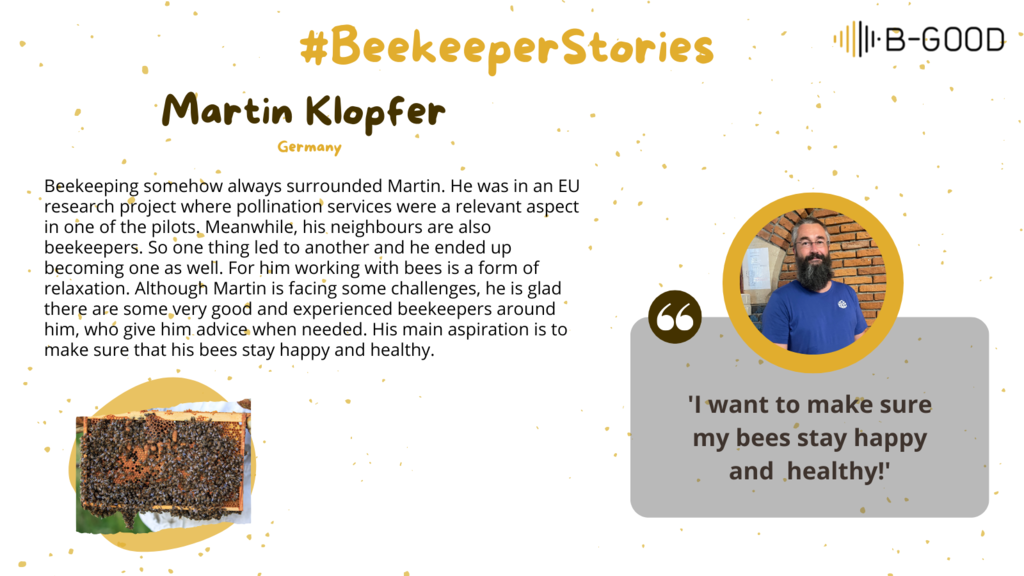
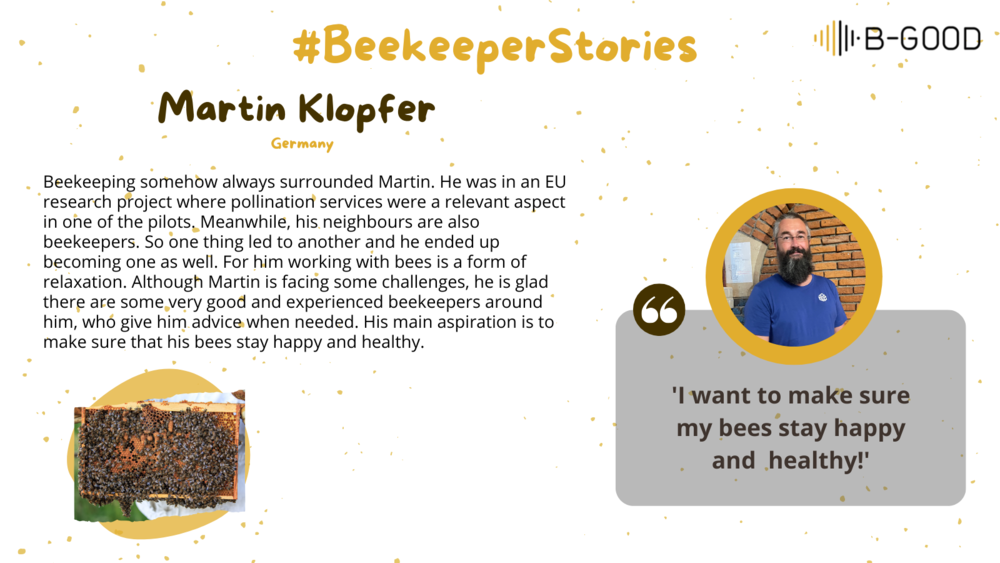
Our guest, Martin Klopfer, shares his story and his long-term goals.
Martin is a beekeeper from northern Germany, working with the B-GOOD project. When we asked him what made him interested in beekeeping, he tоld us that it somehow always surrounded him. Martin used to be a part of an EU project where pollination services were a relevant aspect in one of the pilots. Meanwhile, his neighbours are also beekeepers, which fascinated him. So one thing led to another, and he ended up becoming one as well.
For Martin, working with bees and watching them do their job is a form of relaxation. Honey is, of course, just an added bonus. Although he is facing some challenges, he is glad there are some very good and experienced beekeepers around him, who give him advice when needed. Otherwise, to prevent the excessive opening and closing of the hive, he started using a hive scale right from the beginning.
As a beekeeper, his main aspiration is to make sure that his bees stay happy and healthy.
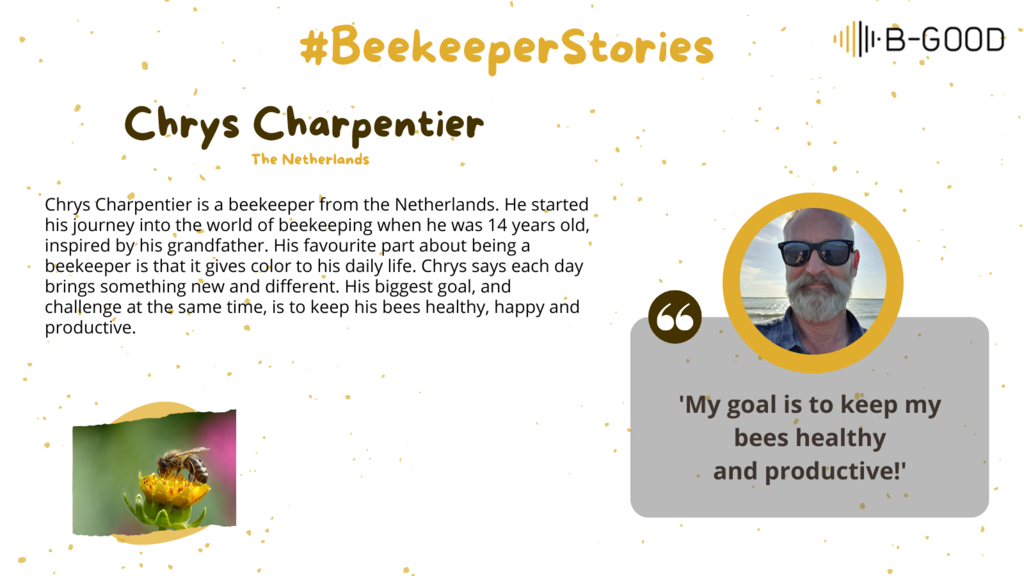
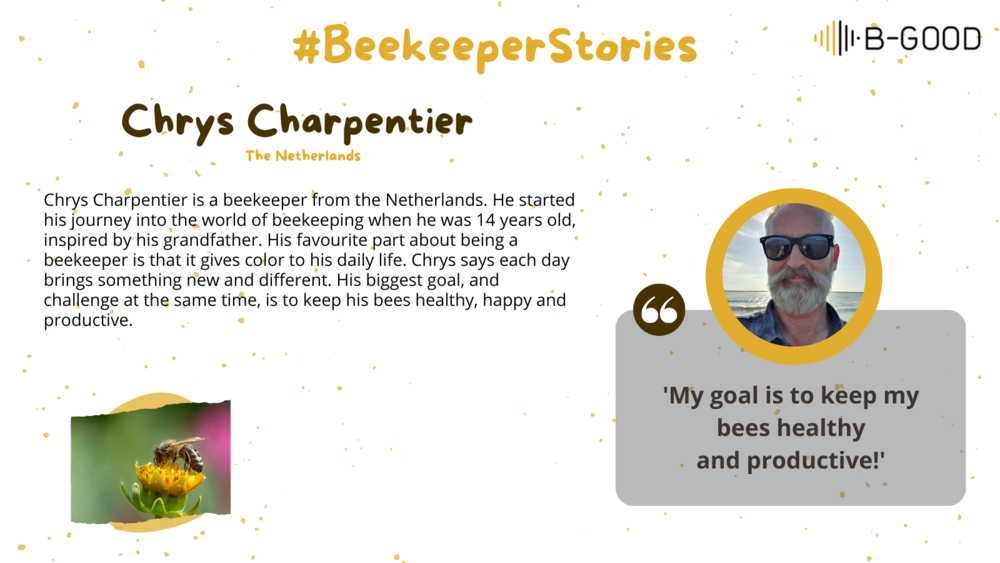
The third feature in the series is Chrys Charpentier. He is a beekeeper from the Netherlands, who shares with us his aspirations and the story behind his passion for bees.
Chrys’ grandfather is a beekeeper who inspired him to become one as well when he was just 14 years old. His favourite part about being a beekeeper is that it gives colour to his daily life. Chrys says each day brings something new and different. His biggest goal, and challenge at the same time, is to keep his bees healthy, happy and productive.
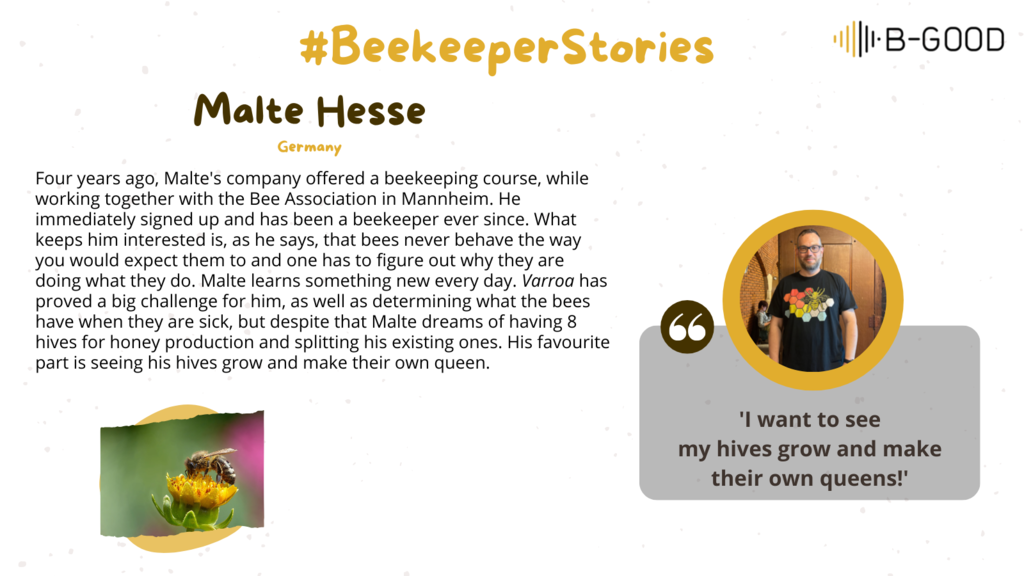
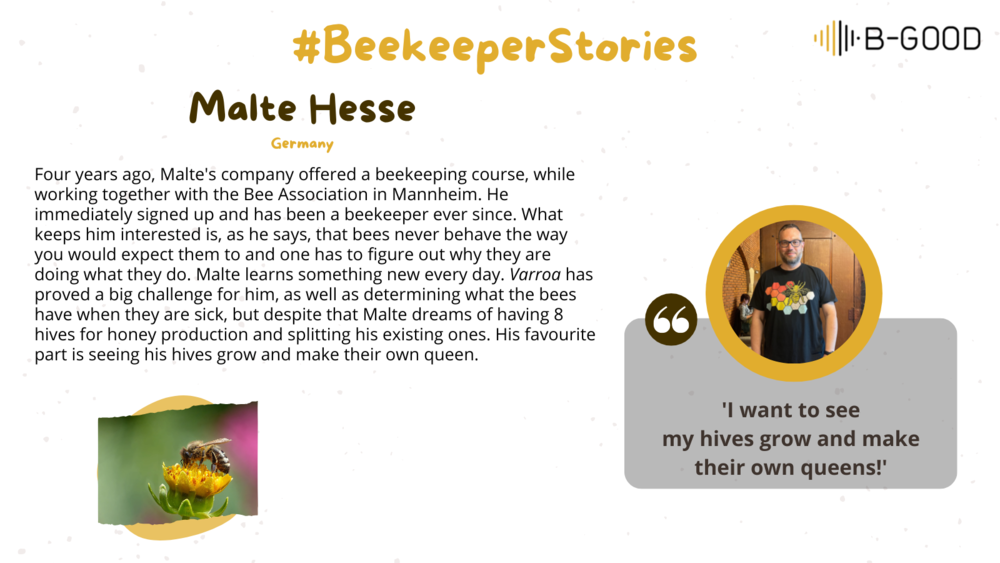
The fourth feature in the series is Malte Hesse.
Malte is a beekeeper from Essen, Germany. Four years ago, his company offered a beekeeping course, while working together with the Bee Association in Mannheim. The training took place on the campus of the company, where the beehives were located. The course sparked Malte's interest and he immediately signed up. He's been a beekeeper ever since. What keeps him interested is, as he says, that bees never behave the way you would expect them to and one has to figure out why they are doing what they do. Malte learns something new every day.
Varroa has proved a big challenge for him since in Germany the only permitted treatment is 60% Formic acid solution and drizzling Oxalic acid on the bees. He says that in times like last summer, when the weather is very humid, these methods are not that effective. Determining what the bees have when they are sick has also been hard for him, but despite that Malte dreams of having 8 hives for honey production and splitting his existing ones. His favourite part is seeing his hives grow and make their own queen.
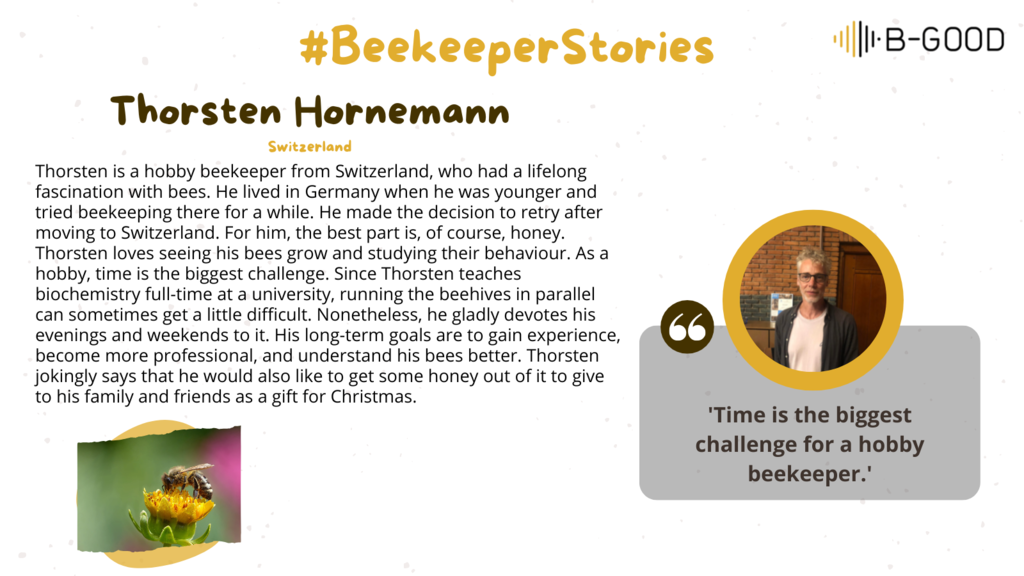
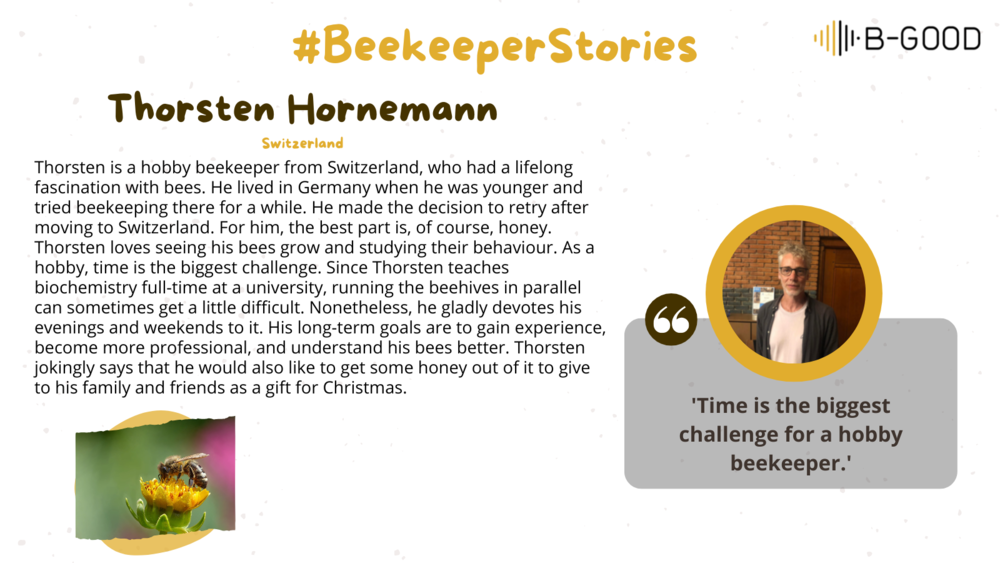
Our fifth feature in the #BeekeeperStories series on Twitter & Facebook is Thorsten Hornemann.
Thorsten is a hobby beekeeper from Switzerland, who joined BEEP and the B-GOOD project. He had a lifelong fascination with insects, especially bees. He lived in Germany when he was younger and tried beekeeping there for a while. He made the decision to retry after moving to Switzerland. For him, the best part is, of course, honey. Thorsten loves seeing his bees grow, studying their behaviour, and analysing how they act and interact.
As a hobby, time is the biggest challenge when it comes to beekeeping. Since Thorsten teaches biochemistry full-time at the University of Zurich, running the beehives in parallel can sometimes get a little difficult. Nonetheless, he gladly devotes his evenings and weekends to it.
His long-term goals are to gain experience, become more professional, and understand his bees better. Thorsten jokingly says that he would also like to get some honey out of it to give to his family and friends as a gift for Christmas.
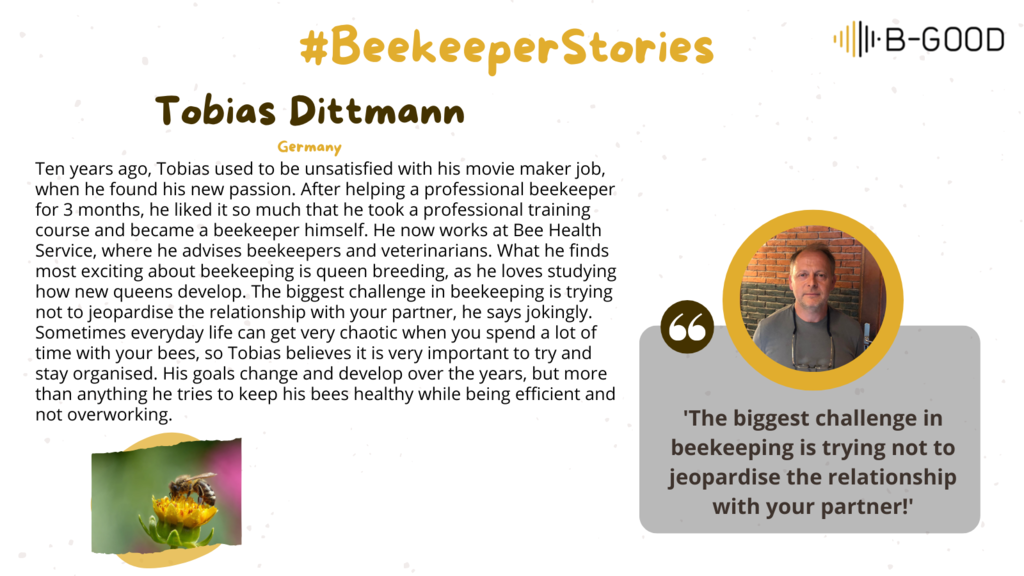
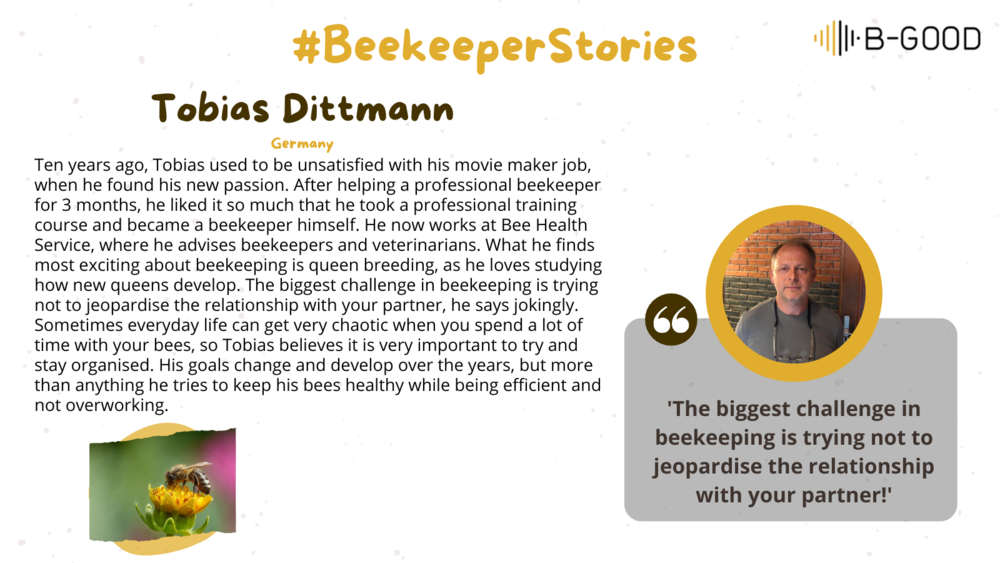
Next up on #BeekeeperStories on Twitter & Facebook is Tobias Dittmann, a beekeeper from Germany.
Tobias is an ex-filmmaker. Ten years ago, he used to be unsatisfied with his movie maker job, when he found his new passion. After helping a professional beekeeper for 3 months, Tobias liked it so much that he took a professional training course and became a beekeeper himself. He now works at Bee Health Service, where he advises beekeepers and veterinarians.
What he finds most exciting about beekeeping is queen breeding, as he loves studying how new queens develop. However, he finds honey extraction the hardest part.
The biggest challenge in beekeeping is trying not to jeopardise the relationship with your partner, he says jokingly. Sometimes everyday life can get very chaotic when you spend a lot of time with your bees, so Tobias believes it is very important to try and stay organised. His goals change and develop over the years, but more than anything he tries to keep his bees healthy while being efficient and not overworking.
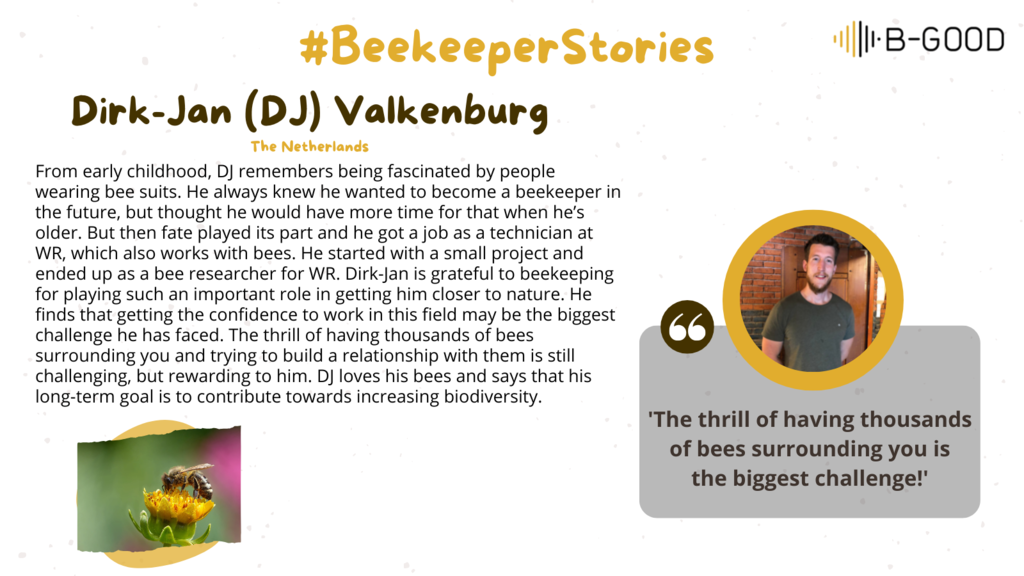
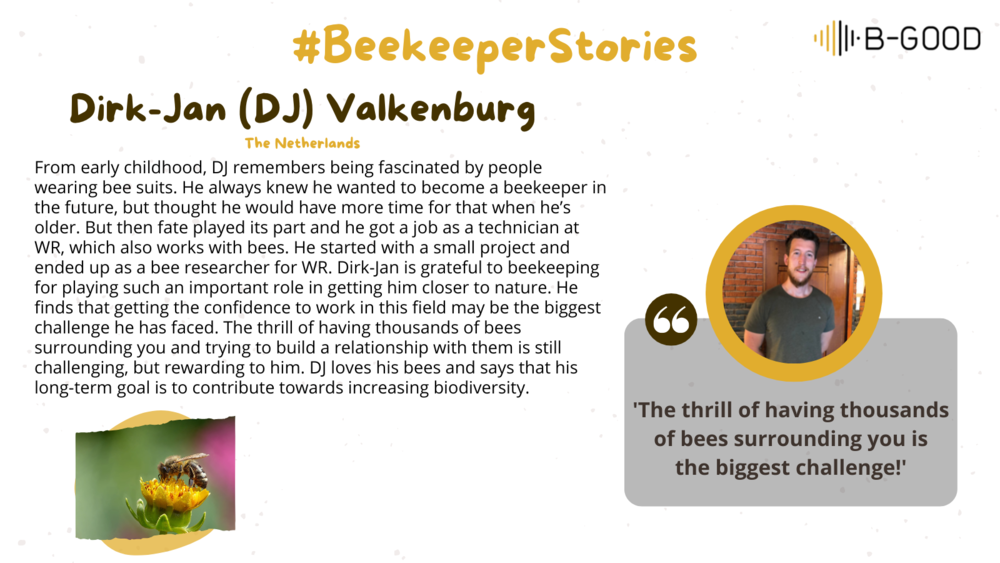
The next feature is Dirk-Jan (DJ) Valkenburg, a B-GOOD researcher for Wageningen University & Research (WR), who is also participating in the project as a Tier 3 beekeeper.
From early childhood, DJ remembers being fascinated by people wearing bee suits. He always knew he wanted to become a beekeeper in the future, but thought he would have more time for that when he’s older. But then fate played its part and he got a job as a technician at WR, which also works with bees. He started with a small project and ended up as a bee researcher for WR.
Dirk-Jan is grateful to beekeeping for playing such an important role in getting him closer to nature. He finds that getting the confidence to work in this field may be the biggest challenge he has faced. The thrill of having thousands of bees surrounding you and trying to build a relationship with them is still challenging, but rewarding to him.
DJ loves his bees and says that his long-term goal is to contribute towards increasing biodiversity.
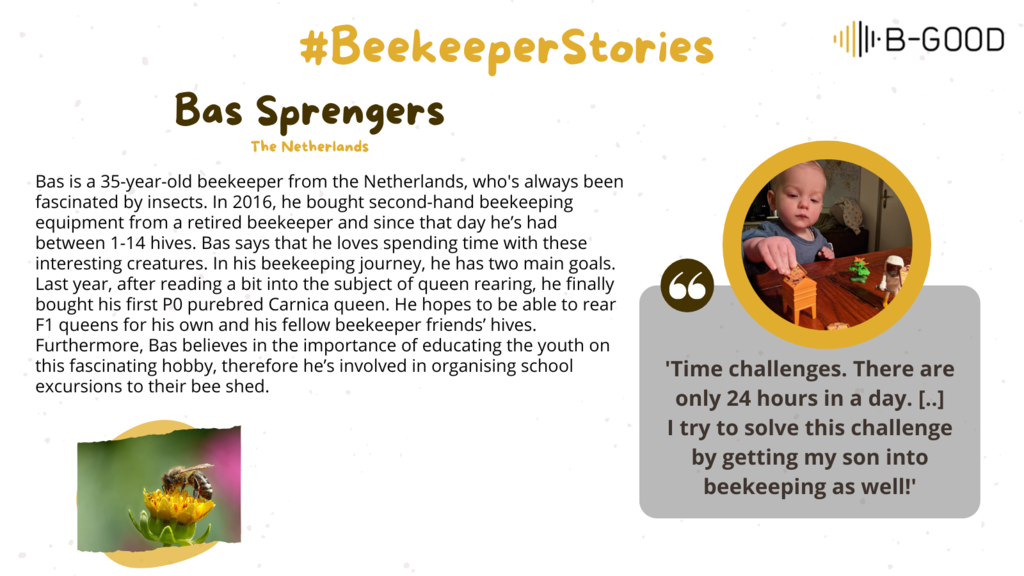
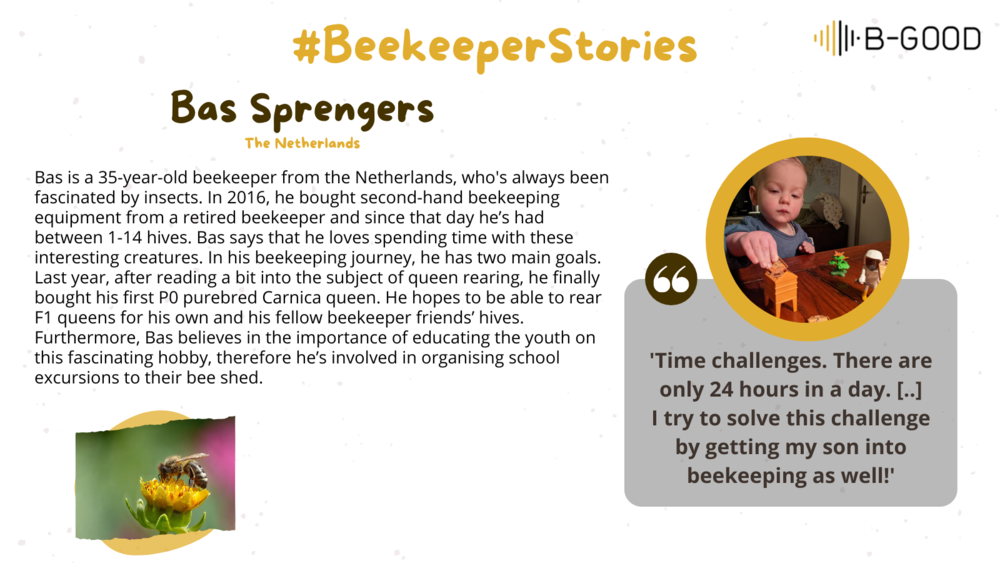
In the eight feature of the series, we present to you Bas Sprengers.
Bas is a 35-year-old beekeeper from the Netherlands. He has always been fascinated by insects. Before starting beekeeping, he used to keep ants in a formicarium. In 2016, after getting his driver’s licence, he bought second-hand beekeeping equipment from a retired beekeeper and since that day he’s had between 1-14 hives. Bas says that he loves spending time with these interesting creatures. Unfortunately, his bee time is limited as not only does he have to take care of his 2-year-old son and work as a scientist, but he likes to enjoy his other hobbies as well - tending to his vegetable garden and brewing beer and mead.
He used to go on trips, organised by the local beekeepers’ associations, with his hives to the rapeseed fields just over the border in Germany. These travels quickly became his favourite part of beekeeping as he loved looking around, seeing nothing but yellow flowers, and hearing nothing but the buzzing of happy bees. Moreover, after the rapeseed blooming season, the hives were filled with the most delicious white cream honey that everyone enjoyed together.
The biggest challenge for him is, of course, time. There are only 24 hours in a day and for some beekeeper duties, like queen rearing, sometimes it’s impossible to postpone a task that has to be done on a specific day. However, Bas came up with the perfect solution - getting his son into beekeeping, so that they can spend more quality time together.
In his beekeeping journey, he has two main goals. Last year, after reading a bit into the subject of queen rearing, he finally bought his first P0 purebred Carnica queen. He hopes to be able to rear F1 queens for his own and his fellow beekeeper friends’ hives. Furthermore, Bas believes in the importance of educating the youth on this fascinating hobby, therefore he’s involved in organising school excursions to their bee shed.
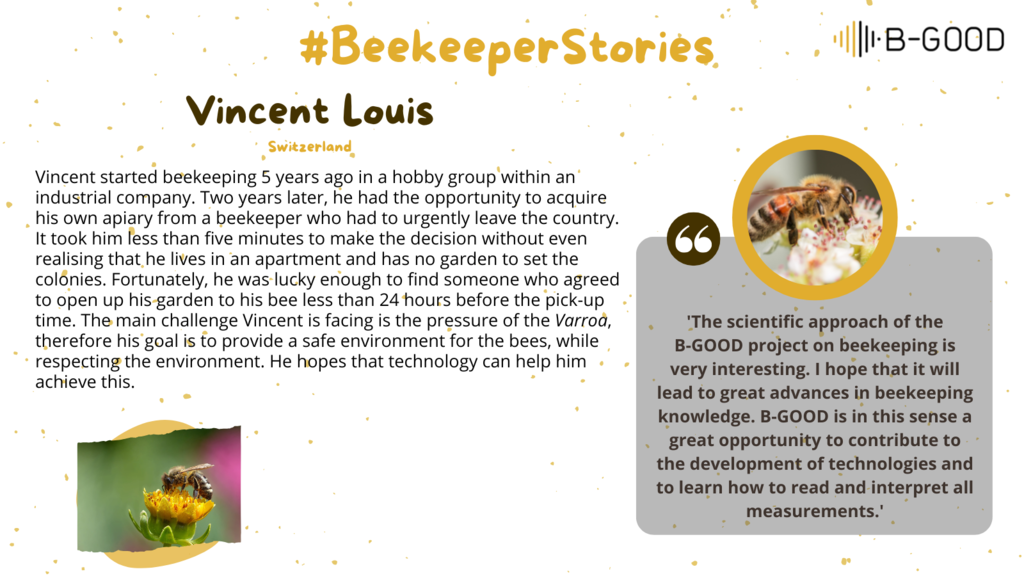
Meet Vincent Louis, a Swiss beekeeper living in Geneva, on the new #BeekeeperStories instalment!
Vincent started beekeeping 5 years ago in a hobby group within an industrial company. Two years later, he had the opportunity to acquire his own apiary from a beekeeper who had to urgently leave the country. It took him less than five minutes to make the decision without even realising that he lives in an apartment and has no garden to set the colonies. Fortunately, he was lucky enough to find someone who agreed to open up his garden to his bee less than 24 hours before the pick-up time.
He loves to observe the hives with all his senses (sight, sound, smell, taste, and touch) the activity and health of the colony, and to take immediate actions to provide the best conditions for the bees. Even though it might be really intense sometimes, he says it’s the best part. Harvesting honey is simply a witness to the good care provided throughout the year.
The main challenge Vincent is facing is the pressure of the Varroa, therefore his goal is to provide a safe environment for the bees, while respecting the environment. He hopes that technology can help him achieve this.
As a B-GOOD beekeeper, Vincent says:
"The scientific approach of the B-GOOD project on beekeeping is very interesting. I hope that this modelling project will lead to great advances in the beekeeping knowledge. The B-GOOD project is in this sense a great opportunity to contribute to the development of technologies and to learn how to read and interpret all measurements."